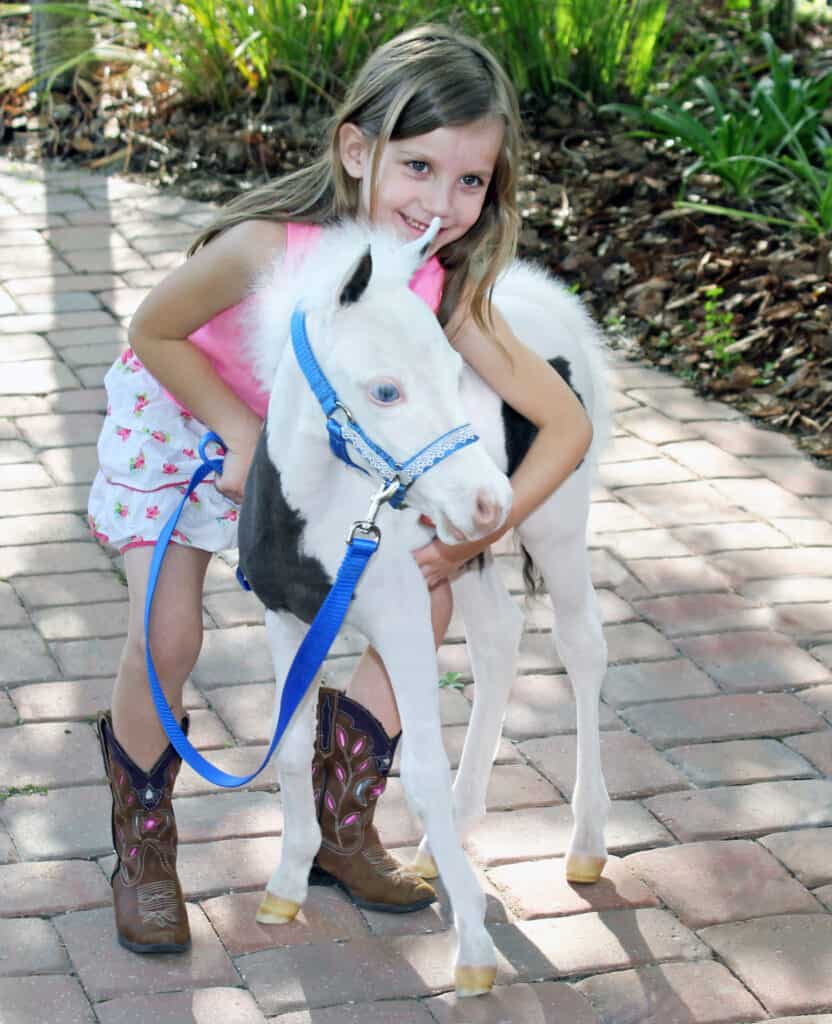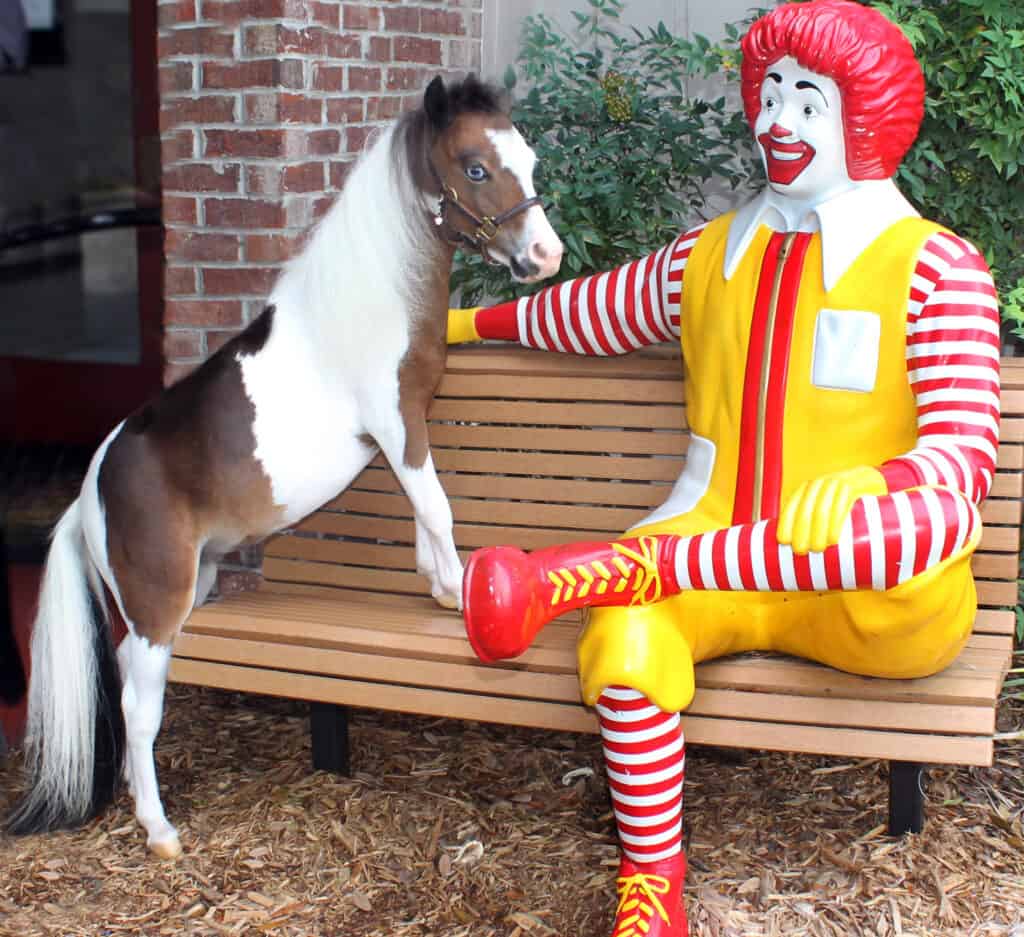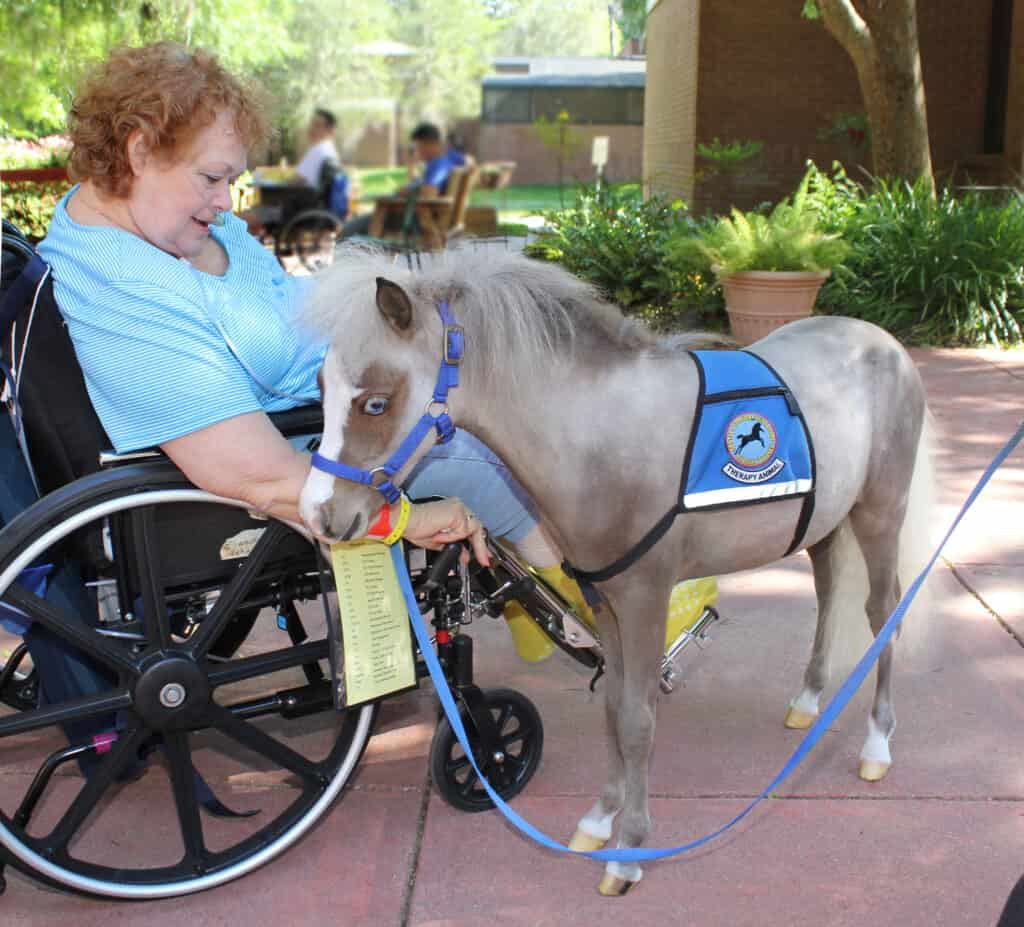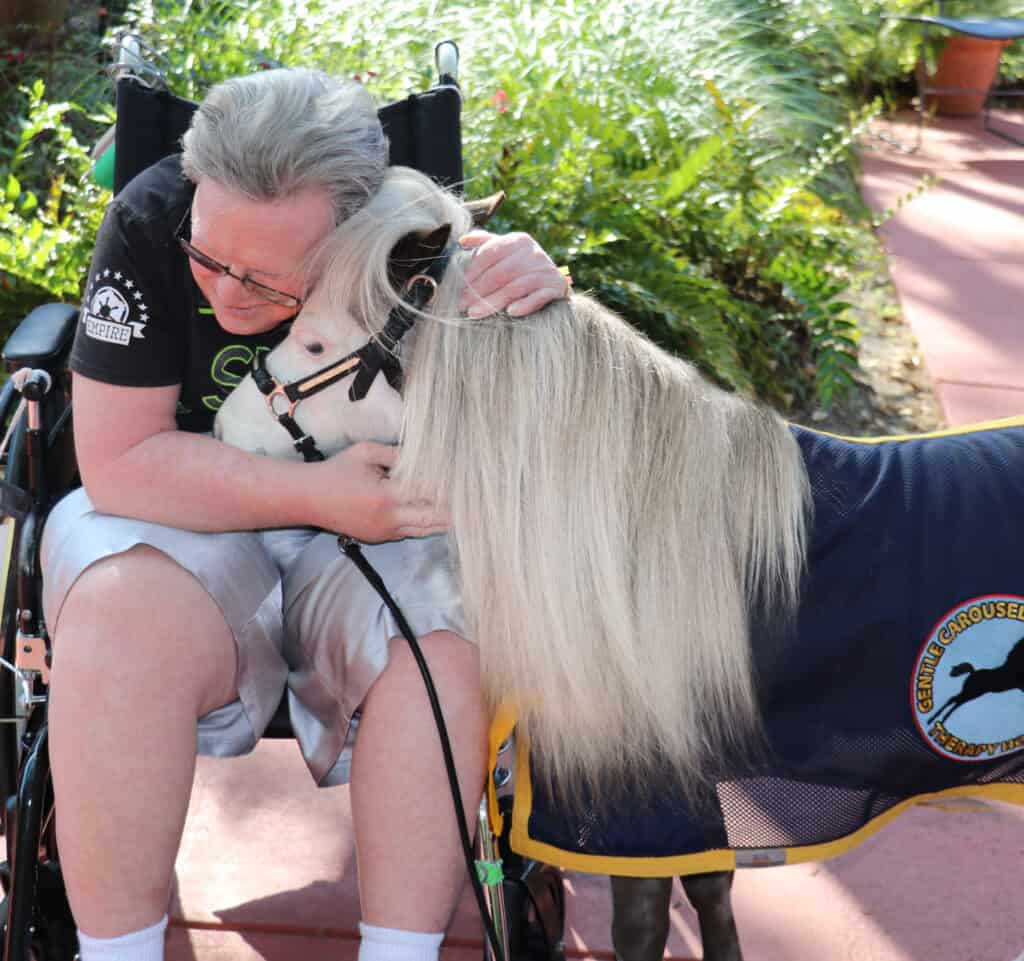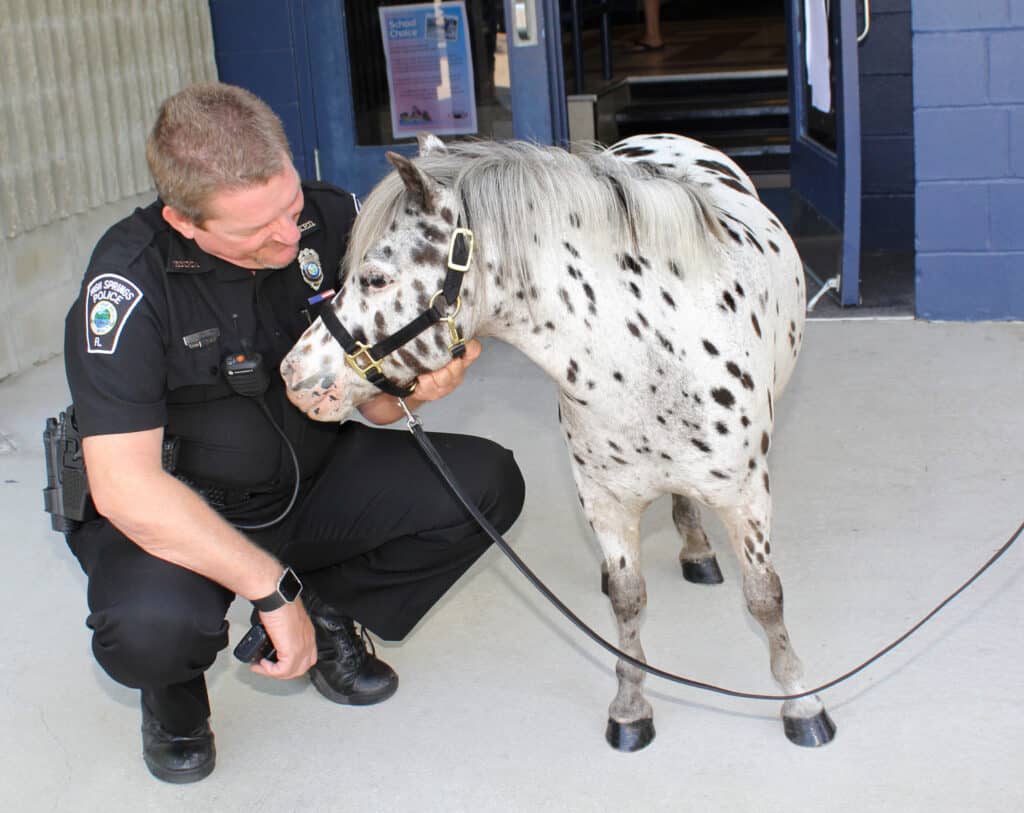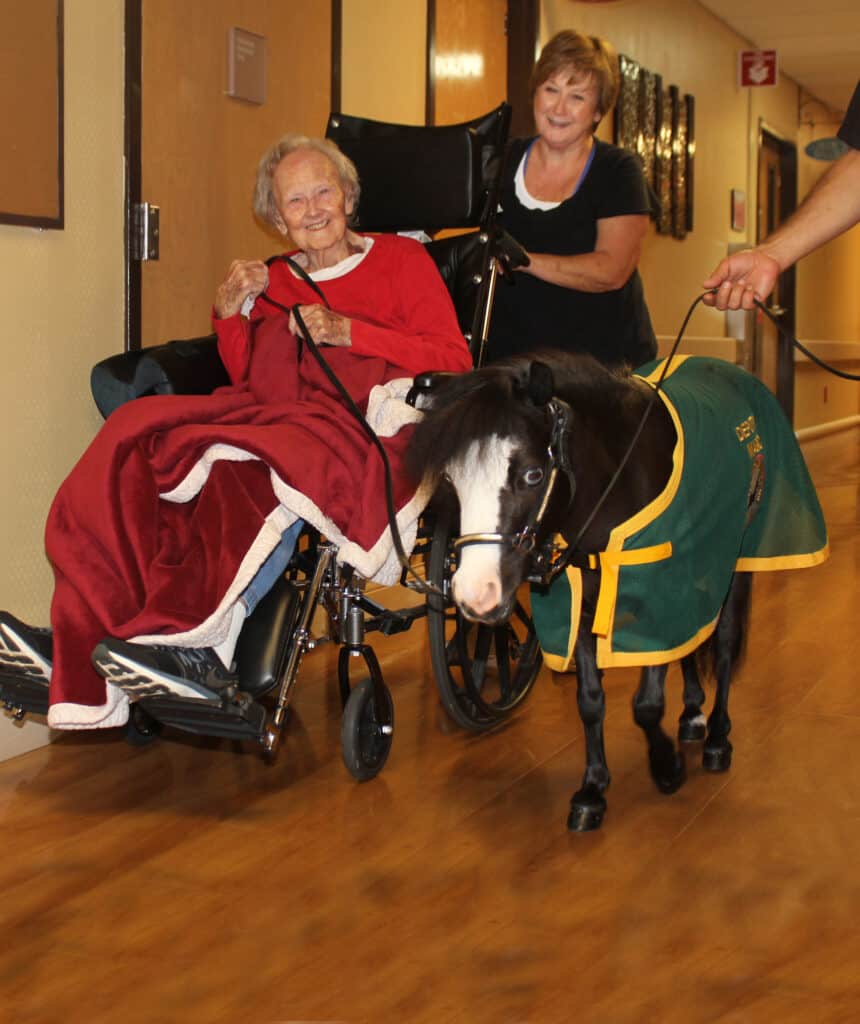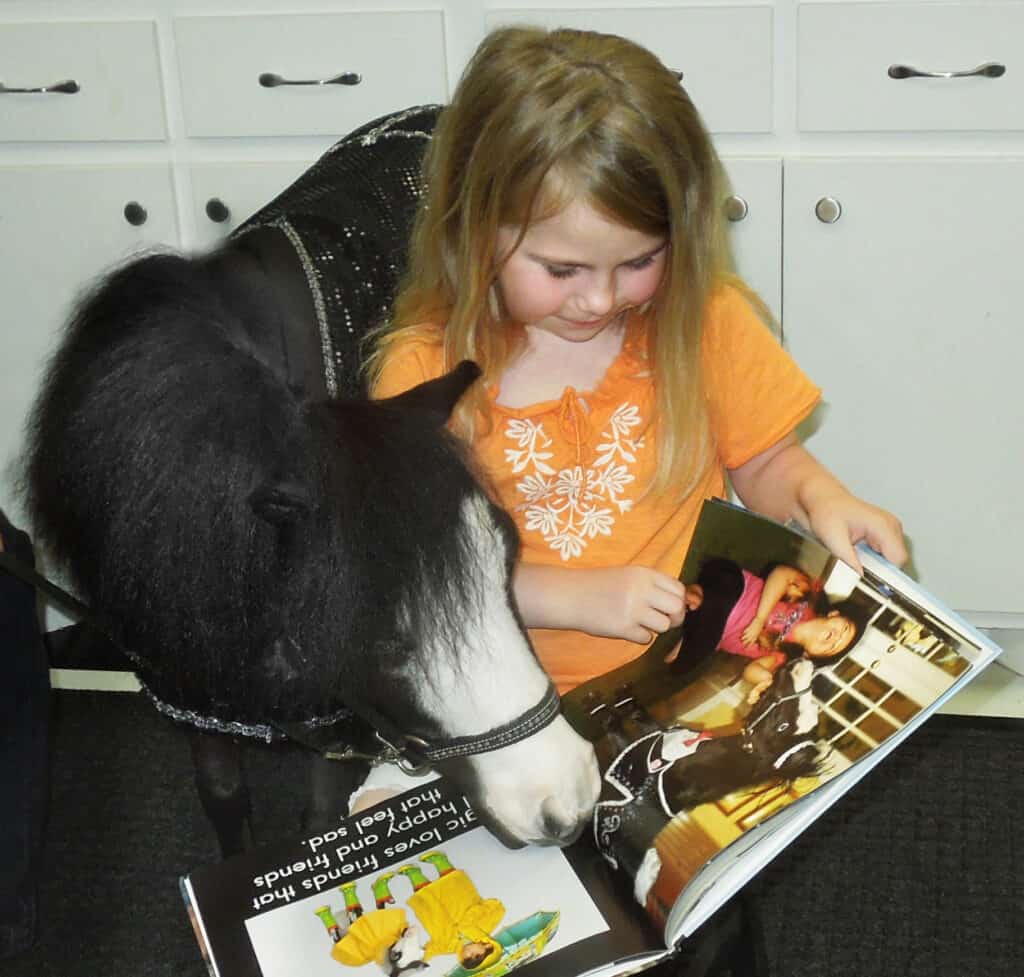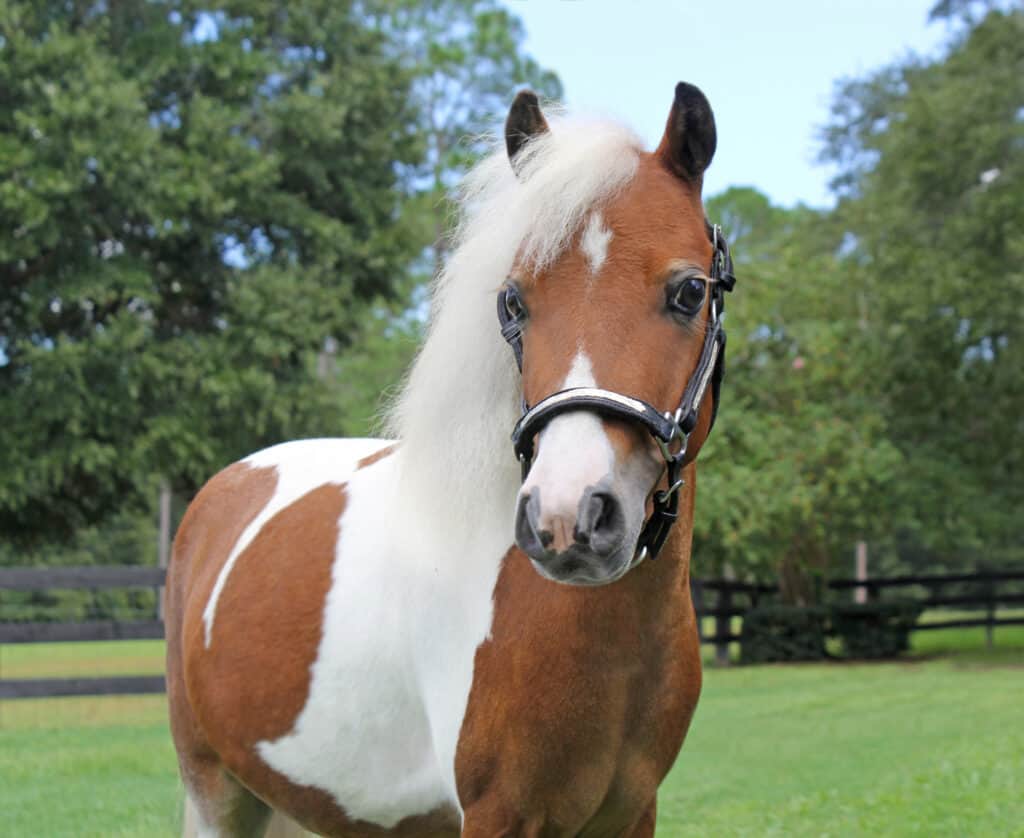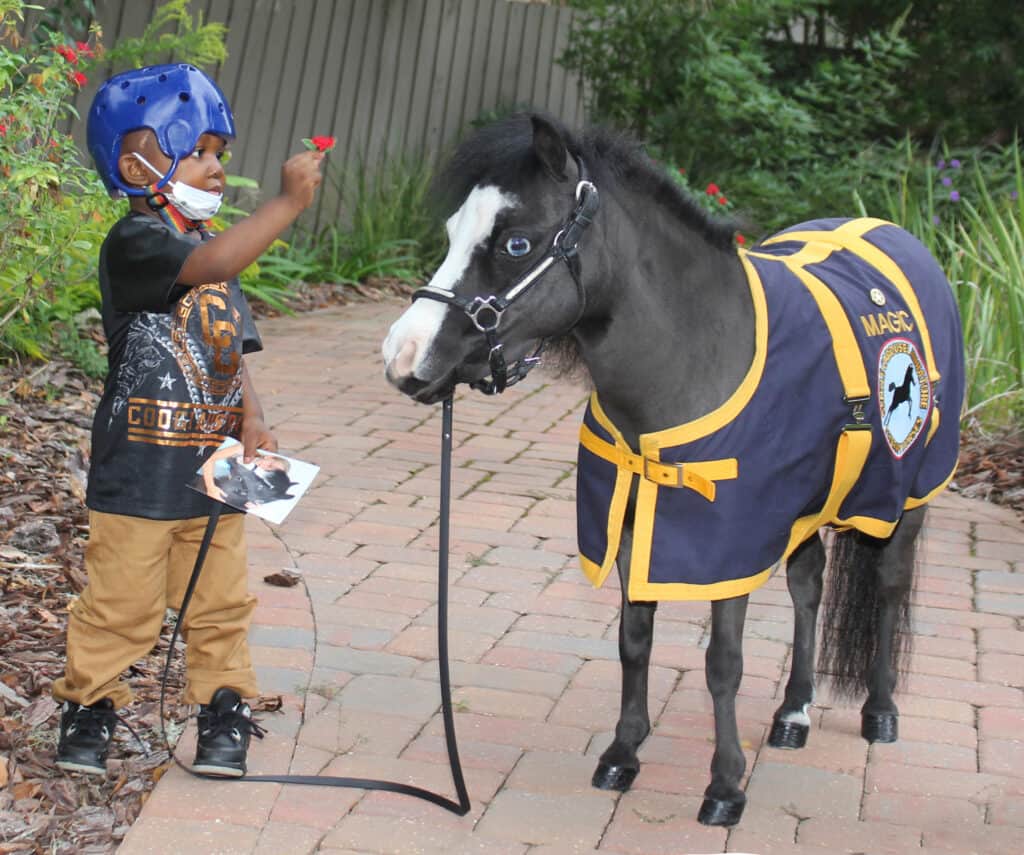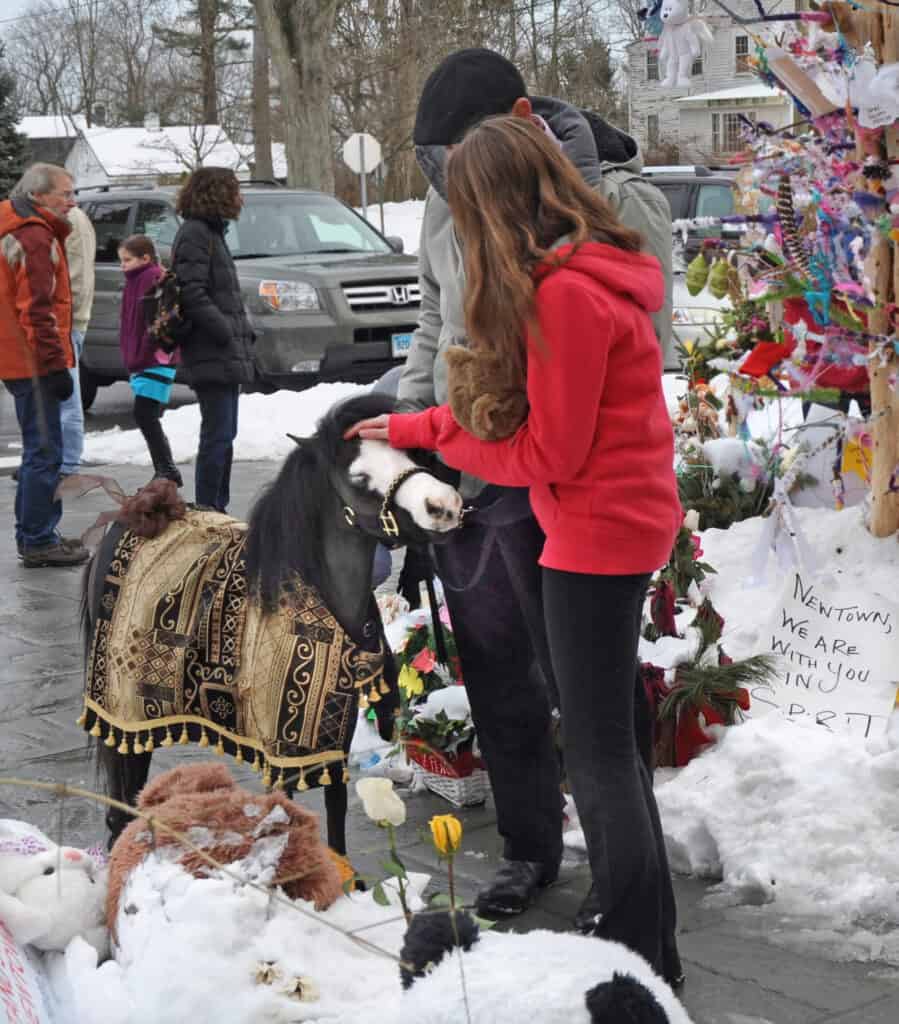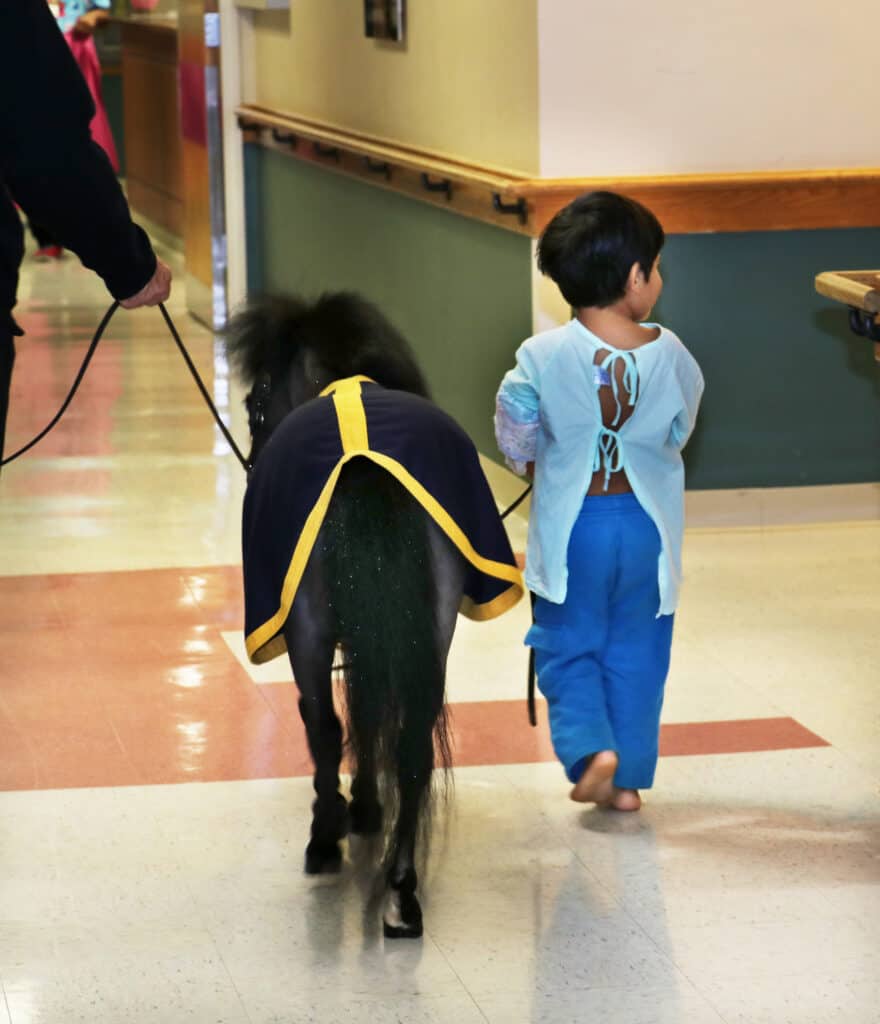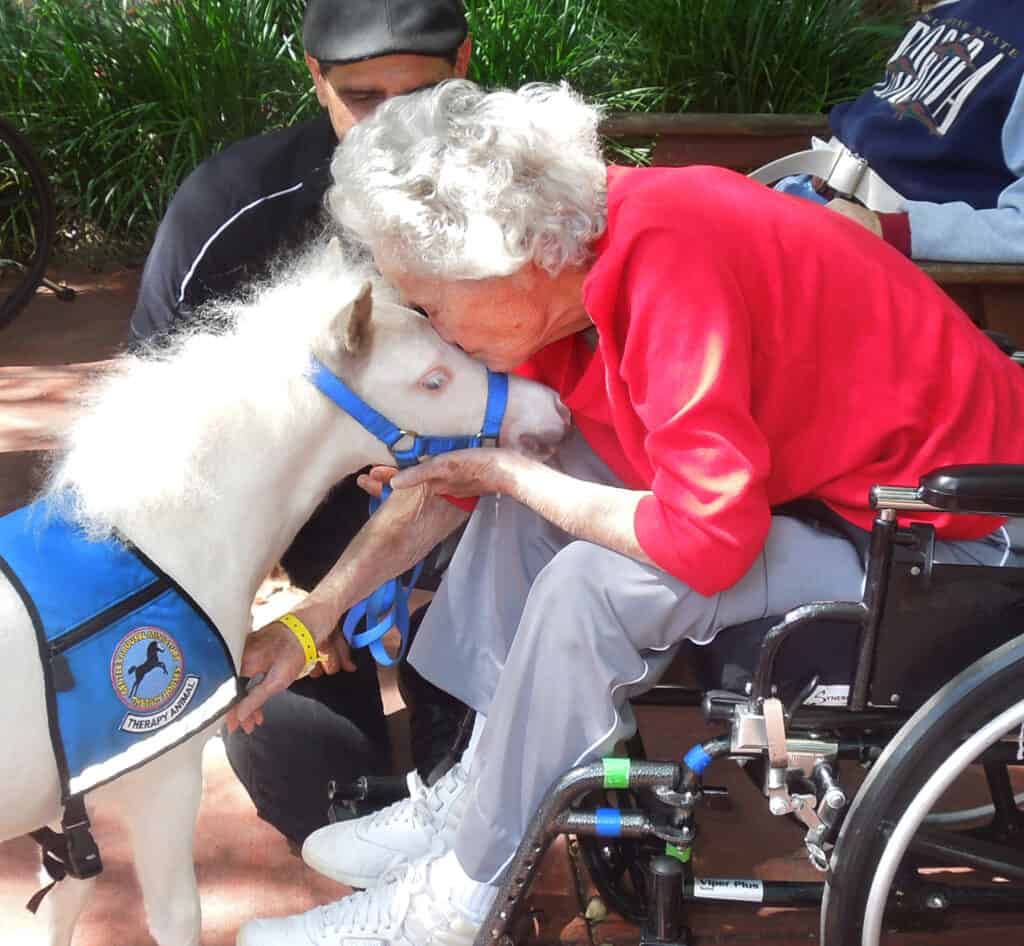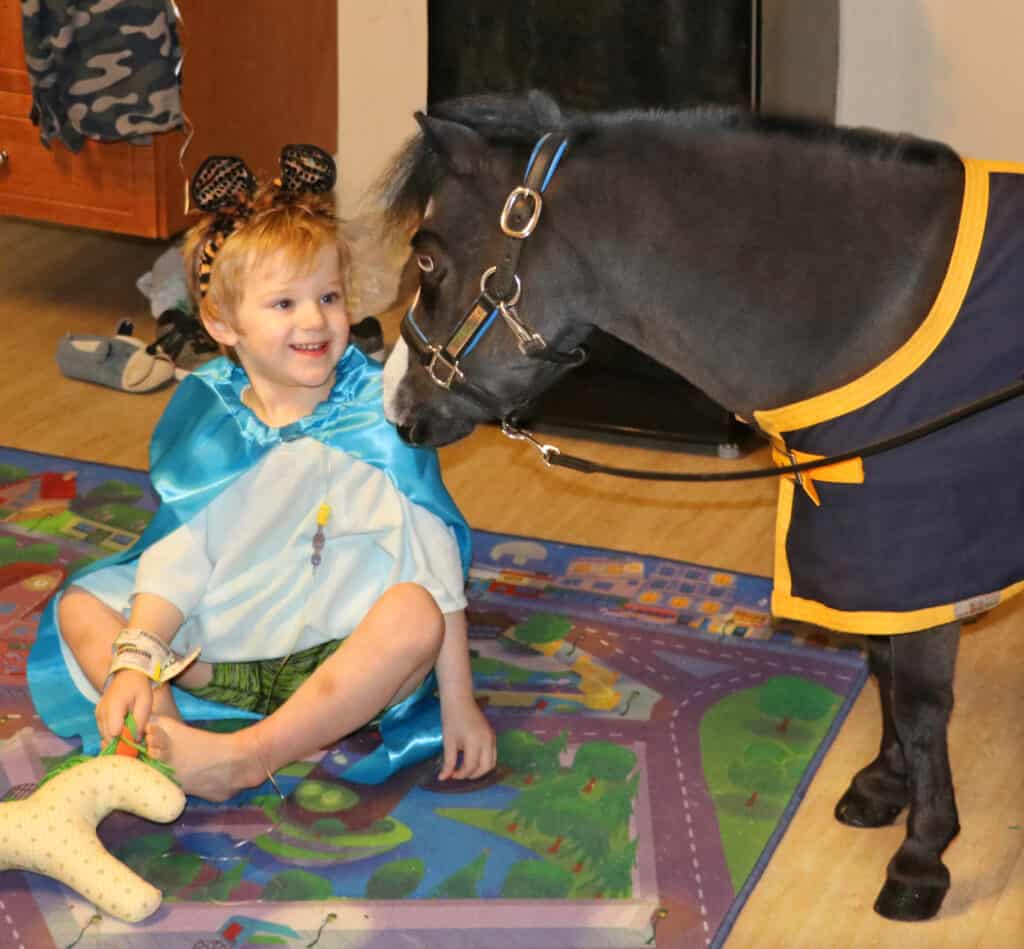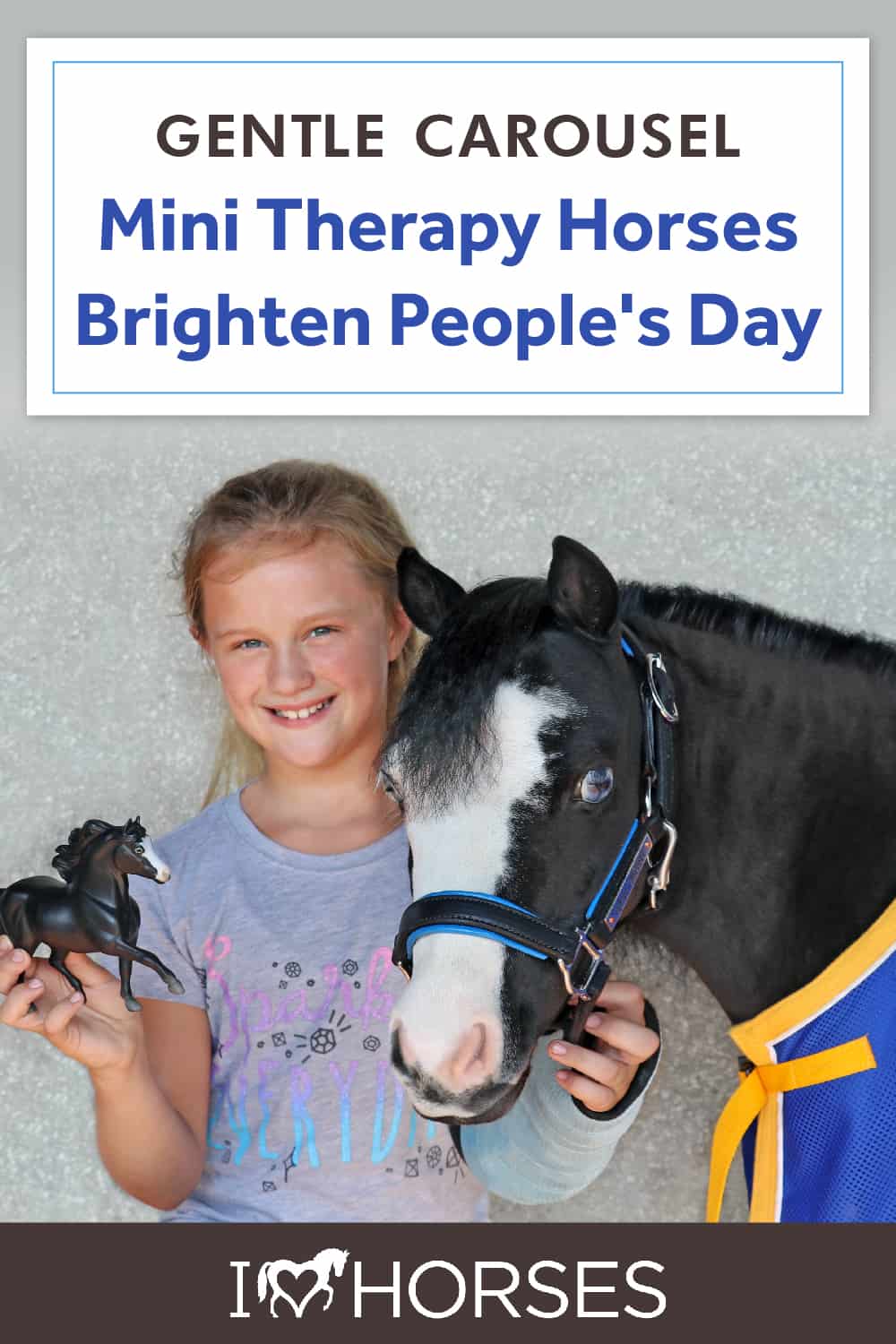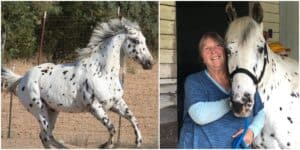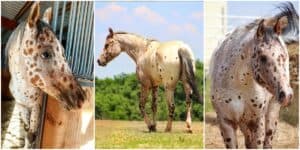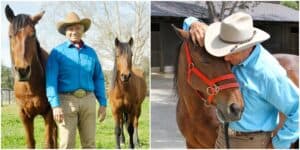Horses have the power to uplift others when they need it most. And Debbie Garcia-Bengochea, the cofounder of Gentle Carousel Miniature Therapy Horses, knows that. She's made it her mission to help train miniature horses so they can spread joy to those less fortunate or for anyone that could really use a smile. For the past 20 years, her horses have worked to deliver their magic to over 25,000 people a year—and they greet people each day as a chance to help others.
When it comes to Gentle Carousel, their mission is to "ease human suffering during times of natural emergencies, violence, traumatic events, medical challenges, and loss with the assistance of highly trained horses, volunteers, and the generosity of donors."
Based out of Ocala, Florida, this team of highly trained and incredibly well-mannered mini horses spread cheer to people all over—and not just in their home state. The award-winning nonprofit has changed the lives of many and made beautiful memories for those in need of hope and happiness. And their heartwarming efforts have been featured on countless news outlets and awarded time and time again.
These horses know they have a job to do, and they make it look so easy. But there's a lot of love, dedication, and training that goes behind that. I reached out to Debbie with some questions that I had about the incredibly kind work that they do, so keep reading to learn all about these truly special equines with hearts of gold.
About Gentle Carousel Miniature Therapy Horses...
Gentle Carousel Miniature Therapy Horses is one of the largest equine therapy programs in the world. Teams of tiny horses bring love to over 25,000 adults and children each year inside hospitals, hospice programs, assisted living programs, and with families, veterans and first responders who have experienced traumatic events. A multiple-award-winning, all volunteer 501(c)(3) organization, the charity is celebrating over 20 years of service.
The horses work with medical professionals in oncology units, the ICU, and with occupational, speech, and physical therapists as part of the treatment for patients who have suffered strokes, traumatic brain and spinal cord injuries, amputations, and burns.
1. What inspired you to start Gentle Carousel Miniature Therapy Horses?
Gentle Carousel Miniature Therapy Horses started more than two decades ago, long before people were using miniature horses indoors as therapy animals. We had to learn many things along the way and break many barriers. At the time, people could travel to therapeutic riding programs, but there was not a program to take horses to those who could not travel. One of the founders was a school principal, so the program started by working with children in high crime neighborhoods.
The therapy horses now go through at least a two-year basic training program. They continue to gain experience and learn new skills for years, but the basic training includes indoor hospital practice and safely interacting with adults and children in a variety of challenging circumstances and locations. It is a rare horse who is both safe and happy working indoors, and there are no shortcuts when it comes to developing confidence and trust between a horse and handler.
2. What's the most rewarding part of the work that you do?
The therapy horses are called in to comfort survivors and first responders of traumatic events like the mass shootings at Sandy Hook Elementary School in Newtown, CT, the Emanuel African Methodist Episcopal Church in Charleston, SC, and the Pulse nightclub in Orlando, FL. They helped the tornado survivors of Moore, OK, victims of the fires in Gatlinburg, TN, families in the aftermath of Hurricane Irma, and visit thousands of patients in children's and veterans hospitals across the country each year.
Watching someone smile for the first time in a difficult situation is one of the most rewarding parts of the charity's work. When an elevator door opens in a hospital and little horses walk out, it is always a magical moment. The therapy horses have worked with patients who have stood or walked for the very first time since their accidents or surgeries.
Gentle Carousel’s literacy program Reading Is Magic inspires young readers and “brings books to life.” The horses of Gentle Carousel’s Reading Is Magic work inside schools, libraries, with mentoring programs, at literacy event,s and at education resource centers in high crime neighborhoods. The program has a special focus on at-risk readers. Helping children with their reading skills is always rewarding.
3. Is there any one experience you've had that's really touched your heart?
Magic has a very special relationship with children in hospital care. One little girl who had a heart transplant and then leukemia said Magic made her face hurt from smiling so much. A boy losing his sight because of a brain tumor held Magic close to his face so he could always remember what she looked like. "It is like she can see inside my soul," he told his mother. A little boy with a life-ending illness who had been in the hospital most of his life requested a visit from Magic. He laughed and hugged her and was so excited. After the visit his mother said, "We have never had a happy day, and now our family will always have a happy day."
Magic always seems to find the person in the room who needs her the most. At a camp for children with cancer, Magic wanted to spend time with a young boy sitting by himself. She put her face against his face, and they both closed their eyes and didn't move for a long time. After their visit, a nurse told us that the boy had just found out his cancer had returned. Magic was in the bedroom of a man who passed away with his hand resting on her head. He told his family earlier that day how much he missed his childhood pony. In one assisted living program, a woman who had not left her room in six months was waiting in the lobby early in the morning when she heard Magic was coming. She held a black-and-white photo in her lap of herself as a child sitting on a pony.
One day a newspaper reporter was taking photos of therapy horse Magic at an assisted living program when Magic walked over and put her head in the lap of a resident. The woman, who had not spoken since she arrived at the facility more than three years earlier, began talking to Magic. "Isn't she beautiful," were her first words. "It's a horse!" The activities director was so surprised to hear the woman speak that she began to cry. She told the woman that she loved her. "I love you too," was the answer, her first sentence to another person in all that time. The woman continued to talk to staff and family members long after Magic's visit.
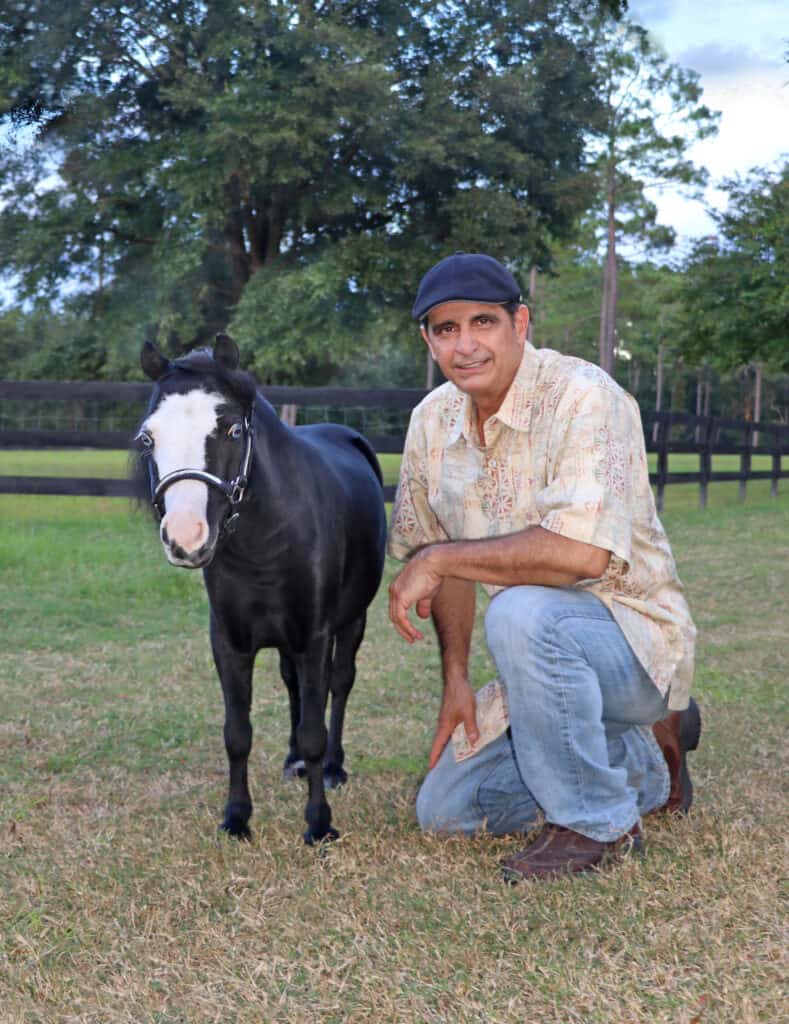
4. Your minis look so happy! Do they know when it's time to "go to work"?
When the therapy horses are not traveling, individual horses work no more than two days a week. When they walk indoors at a hospital or other building, they know they are on duty. The therapy horses work in environments that most horses never experience. Because they travel and we ask so much of them, we feel it is our responsibility to let them have as natural a life as possible when they are home...We think it makes them happy.
The [horses] live in a lifelong herd with a lot of room to move all day long. Our horses may be cute and small, but they are genetically the same as any horse, with the same physical and emotional needs. To encourage important healthy movement throughout the day, we place low sugar forage/hay, granular salt and minerals, water, etc., in different locations over many acres. We think the constant physical movement of the horses is one of the reasons they are so healthy. We do not restrict their natural continuous movement or keep them confined in small areas, especially when they are eating. To help keep the therapy horses safe, a team of Maremma sheepdogs live with and protect them at all times. Maremmas are a 2,000-year-old breed of livestock guardian dog, and they allow the tiny horses to live a natural life.
5. What's something special about your horses that you'd like for people to know?
Working indoors would be a challenge for any horse, but Gentle Carousel Miniature Therapy Horses make it look easy, even in high rise hospital buildings, hotels, and convention centers. The therapy horses walk up and down steps, ride in elevators, walk on unusual floor surfaces, carefully move around hospital and television studio equipment, work in small patient rooms, and stay calm around unexpected sounds like ambulances, alarms, and hospital helicopters...And yes, they are house trained.
It takes a lot of work to make what they do look effortless.
Even during the current health situation, the horses have adapted and continue their service. While visitors may not be allowed inside right now, the horses say hello to patients through the windows. Gentle Carousel volunteers use iPads to talk to patients inside and carry signs with messages to be seen from the windows. Homemade stuffed horses are sent inside to assisted living home residents, so they each have one before the horses meet them at the windows. The therapy horses have also helped deliver children's books and boxes of snacks to children in high crime neighborhoods. They have filmed reading programs for children to help replace their usual summer literacy programs. The therapy horses have also been filming programs for hospitals and making FaceTime phone calls to patients. "There is a pony on the phone for you!" The horses have stayed just as busy as they were before the COVID-19 challenges.
With everything going on, this has also been a very difficult time for the charity. Both annual fundraisers that support the horses and their work were canceled this year due to the health situation. Expenses stay the same, so without those planned donations it is a challenge right now.
I'd like to give a special thank-you to Debbie for taking the time out of her busy schedule to answer my questions, and for allowing me to share her many beautiful images with the iHeartHorses readers. If you know someone who would enjoy reading about these horses and the amazing things they do for those in need, share this article with them!
Horse Courses by Elaine Heney
- Listening to the Horse - The Documentary by Elaine Heney & Grey Pony Films
- Shoulder In & Out Training for better balance, bend & topline development with your horse
- Over 110+ Polework Exercises & Challenges to Download
- Dancing at Liberty & Creating Connection with Your Horse (11 lessons) - Grey Pony Films
Keep up with these adorable equines on social media, via Facebook, Instagram, and on their website.
All Images Courtesy of Gentle Carousel Miniature Therapy Horses

